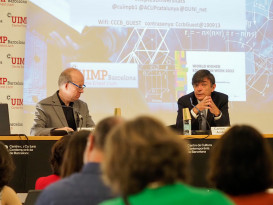The challenges of higher education and scientific research: How to transform universities? - Cycle of Seminars of the CUIMPB-Ernest Lluch Center
Within the framework of the World Higher Education Week 2022, which is held in Barcelona from the 16th to 20th of May, the CUIMPB-Centre Ernest Lluch has organized an event as part of a Cycle of Seminars carried out in collaboration with the Global University Network for Innovation (GUNi) and the Catalan Association of Public Universities (ACUP). The Cycle aims to delve into issues relevant to university and research policy and management.
In this occasion, the focus was put on the challenges facing the public university today and on how we can transform these institutions to respond to them. In a context of great social, economic and technological changes, and in face of local and global challenges such as climate change, globalization and the crisis of democracy, universities must question their social function and strategic objectives.
What should university education be like at the beginning of the twenty-first century? How to promote equity and equal opportunities in higher education? Should the principles of university autonomy and academic freedom be rethought? How can universities contribute to making the UN 2030 Agenda and the Sustainable Development Goals a reality? What should the profile of the teaching and research staff be? How to promote responsible and socially committed scientific research?
 The event, presented by the Executive Secretary of the ACUP-GUNi, Josep M. Vilalta, has been introduced by Carlos Andradas, Rector of the Menéndez Pelayo International University, who has appealed to universities, but also to governments, to become aware of the critical moment that the higher education sector is experiencing: "We are risking the future of higher education", he sentenced. And he has highlighted "the importance of provoking these debates to raise awareness about the current situation, about what the current challenges are and how to face them".
The event, presented by the Executive Secretary of the ACUP-GUNi, Josep M. Vilalta, has been introduced by Carlos Andradas, Rector of the Menéndez Pelayo International University, who has appealed to universities, but also to governments, to become aware of the critical moment that the higher education sector is experiencing: "We are risking the future of higher education", he sentenced. And he has highlighted "the importance of provoking these debates to raise awareness about the current situation, about what the current challenges are and how to face them".
Considering the current social challenges and the main trends we are experiencing –the return of nationalism; the growing fragmentation, rather than cohesion, etc.– the guest speaker, Sijbolt Noorda, President of the Magna Charta Observatory (Bologna) and the Academic Cooperation Association (Brussels), has appealed to define the university as an "academic community at the service of society", emphasizing the importance of the community over individuality and the need to rethink the university understanding its social function as an intrinsic and essential aspect.
To respond to the trends that are putting the university at risk, Noorda has presented 3 key points that higher education institutions must take into account and put into practice:
- Contemporary changes and their impact on universities must be monitored, including serious self-reflection by the institutions and a firm commitment to the community.
- Universities must be open and tolerant communities and, at the same time, a good model for the rest of the world.
- Good decisions made in terms of programs and partnerships must be made from the community point of view, overcoming individualistic and fragmented practices.
After Sijbolt Noorda's presentation, a round table has been held with the presence of the Secretary-General of the Universities of the Government of Spain, José Manuel Pingarrón, Francesc Graell, Rector of the UNESCO International Institute for Higher Education in Latin America and the Caribbean, Daniella Tilbury, Commissioned for Sustainable Development and Future Generations of Government of Gibraltar, and Josep M. Vilalta, Executive Secretary of ACUP-GUNi. The panel, moderated by Júlia Miralles de Imperial, Delegate of Science and Universities of the Barcelona City Council, has focused on how to transform university institutions to build democratic, progressive, and sustainable societies.

The interventions of the speakers at the debate have allowed to provide interesting perspectives and diagnoses on contemporary challenges from diverse territories in relation to higher education, while signaling the practices that are promoted from the various institutions represented to respond to the challenges and difficulties. Looking ahead, " the institutions of higher education must rethink what they do and how they do it" if they want to get a university that works for social justice, Tilbury said.
